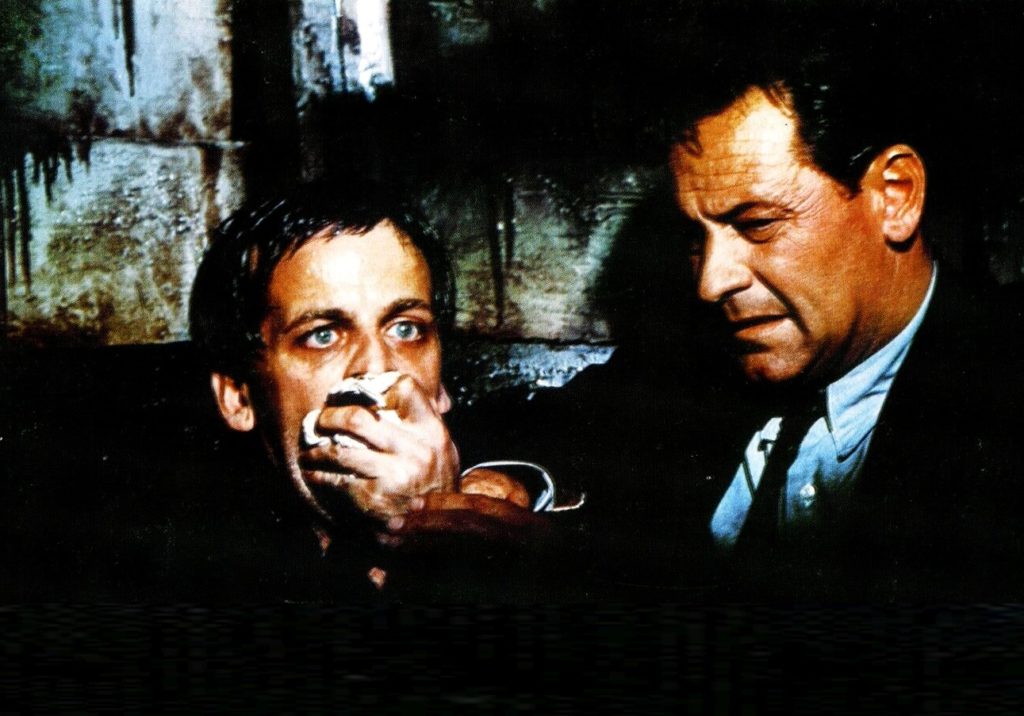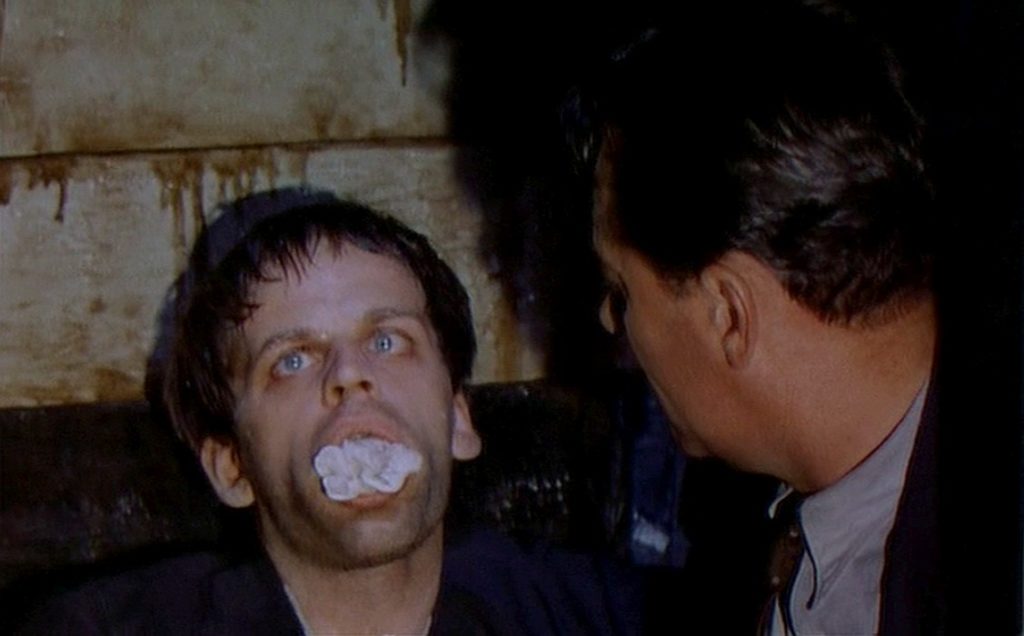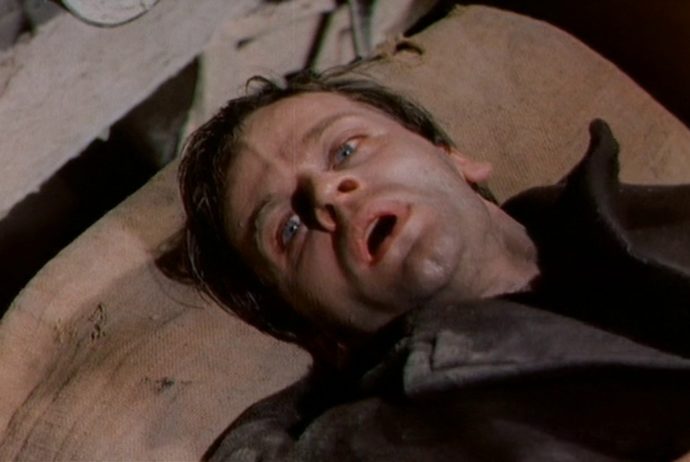Dir: George Seaton
Star: William Holden, Lilli Palmer, Hugh Griffith, Klaus Kinski
Get a cup of coffee, Kinski fans, and perhaps a sandwich as well, because you’re going to be waiting quite a while for Klaus to show up in this one. As in, he appears only ten minutes before the end – and that’s in a film which runs for two hours and twenty minutes. Frankly, I had given up hope, and was beginning to think I had missed him entirely. I restored to Googling some other reviews which did re-assure me that he was just going to enter proceedings very, very late to the party. They were right enough: you just need patience. Whether there’s enough going on to sustain your interest until that point? Well, it’s a bit of a mixed bag, I’d say.
The film is based on a book written by Alexander Klein; detailing the exploits of wartime secret agent Eric Erickson, who went into Nazi Germany in order to pass back key information to the Allied forces. What makes this different from other war-time escapades, e.g. A Time to Love and a Time to Die, is that this is non-fiction. Though in its review of the book, The New York Times said, “The trouble with fictionalized true-life stories is that the reader never really knows which part is fiction and which part is true life. This is particularly disturbing in adventure tales whose flavor lies primarily in their assurance to the reader that what may seem unbelievable has really happened.”
As far as Erickson’s story, and Klein’s re-telling of it goes, there appear to be some doubts as to its authenticity. Indeed, going by that article, the movie may be more accurate than the book in some ways. It does depict Erickson (Holden), correctly, as someone working in neutral Sweden, who was content to sell to both sides, even years after Hitler’s armies blitzkrieged their way across Europe. He only agrees to spy for the Allies after his name is publicly placed on a blacklist of Nazi collaborators, in the movie being handled by Collins (Griffith), an intelligence officer with no qualms about sources. “My job is information, and in order to get it, I will deal with thieves, liars, procurers, traitors, sluts, the lot. I really don’t care if you’re Goebbels’ half brother or if you sell heroin for a living.”
A project to build a refinery in Sweden for Nazi use is concocted, allowing Ericson to travel back and forth to Germany, and obtain data on their current oil production systems. One of his contacts there is upper-class Frau Marianne Möllendorf (Palmer), whose unhappy marriage plays into the two spies falling in love (while a fictional character, there was an equivalent in reality, Anne-Maria Freudenreich. As a Swedish citizen, Erickson had a certain degree of protection, when the true purpose of his visits comes perilously close to being revealed. The same doesn’t go for Möllendorf, who is also increasingly troubled by her religious faith, after information she passed on results in the destruction of a school and its pupils. Conversely, Erickson’s own motivation becomes less pragmatic, after he witnesses a Nazi atrocity first-hand.

Eventually, the network of agents is cracked by the Gestapo, with Möllendorf being captured and executed (this did happen to Freudenreich, though likely not in front of Erickson’s eyes, as the film depicts). With his cover blown, Eric has to make his way through Germany, across the Danish border and from there across the three-mile wide strait separating that country from Sweden. While this appears to be an entirely fictional element, it’s in this final sequence where we meet Kindler (Kinski), a Jewish refugee also fleeing the Nazis. They share a trawler on the final leg of the journey, but Kindler is severely ill, and has to be carried bodily by Eric onto the boat. His loud wheezing (above) could result in their discovery by the Germans, who are patrolling the water between the two nations.
There’s very little to Klaus’s part, he barely says anything beyond a groan, and it’s not particularly coherent. As the image below suggests, it doesn’t end well for Kindler: according to Erickson, “He choked to death rather than cough.” I must confess, my first instinct was to call for a forensic examination of the body. There’s a significant difference between “He choked to death” and “He was choked to death”. The somewhat surprised expression on the corpse’s face make me lean toward the latter. I’m just sayin’… It’s interesting how the film groups its supporting cast by country, with Kinski ninth of the ten players listed from Germany. This was largely shot on location, in Stockholm, Copenhagen, Berlin and Hamburg, and that certainly lends value to the production.
The movie does a good job of depicting the relentless mistrust, inherent to the world of espionage. Erickson finds it hard to tell who’s who: friends can turn out to be enemies, while those apparently operating against you can actually be acting in your best interests. Leverage is everything: the only people he can truly trust are those who’d be dragged down with him, if Erickson were to be caught. However, the film is a good thirty minutes too long, and Erickson’s frequent voice-over, particularly common in the early going, adds little of note. For me, the biggest problem was the trite depiction of the romance between him and Frau Möllendorf. While both Holden and Palmer deliver decent performances, the script forces them together, more out of apparent duty than mutual attraction.
There are still some good sequences which you’ll remember. The ones which particularly stick in my mind include the mass civil disobedience on bicycles in Copenhagen, to help Erickson escape, and Möllendorf’s confession of her sins, which proves a fatal mistake. I can’t say it felt like I had wasted my time entirely, and this is a reasonable, and I suspect accurate enough in tone (if not necessarily specifically factual), depiction of what life as a spy of this kind was like. Just be aware that there will be an awful lot of wartime water flowing under the bridge, before Klaus takes the stage.

